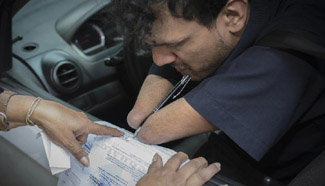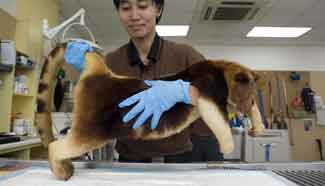MANILA, July 12 (Xinhua) -- The tribunal handling the South China Sea arbitration case unilaterally initiated by the former Philippine government issued its final award on Tuesday, amid a global chorus that the panel has no jurisdiction and its decision is naturally null and void.
In the 479-page award, the five-member tribunal sweepingly sided with the claims filed by the administration of former Philippine President Benigno S. Aquino III.
Among other conclusions it reached in blatant disregard of historical facts and general international law, the tribunal denied China's long-standing historical rights in the South China Sea.
Chinese President Xi Jinping, in a meeting with visiting European leaders on Tuesday, said that China will not accept any proposition or action based on the award, and that China's territorial sovereignty and maritime interests in the South China Sea will under no circumstances be affected by it.
China has refused to participate in the proceedings, reiterating that the tribunal has no jurisdiction over the case, which is in essence related to territorial sovereignty and maritime delimitation.
The Chinese government has pointed out that territorial issues are not governed by the UN Convention on the Law of the Sea (UNCLOS), and that it has -- in line with UNCLOS -- excluded disputes concerning maritime delimitation from mandatory dispute-settlement procedures. Some 30 other countries have also made similar exclusions.
"The Ministry of Foreign Affairs of the People's Republic of China solemnly declares that the award is null and void and has no binding force. China neither accepts nor recognizes it," the ministry said in a statement shortly after the award was announced.
Describing the arbitration as a political farce under the pretext of law, Chinese Foreign Minister Wang Yi said that by not participating in and not accepting the arbitration, China is upholding international law and regional rules.
The Aquino administration filed the arbitration against China in 2013, despite the agreement his country had reached with China on resolving their disputes in the South China Sea through bilateral negotiations.
Although Manila asserted that its submissions do not concern territorial sovereignty or maritime delimitation, the Philippine Foreign Ministry, a day after launching the arbitration, described the purpose of the case as to "protect our country's territory and oceanic area."
Xu Liping, a senior research fellow with the National Institute of International Strategy at the Chinese Academy of Social Sciences (CASS), stressed that UNCLOS should never be allowed to serve as a tool for certain interest groups to decide on sovereignty-related disputes.
"The award, a typically unfair and arbitrary verdict, represents a huge blow to the world's confidence in the international legal system and the integrity of arbitration proceedings," he said.
While rejecting the award, the Chinese Foreign Ministry also reiterated that China will continue to work with directly concerned countries to resolve the relevant disputes in the South China Sea through negotiations and consultations.
In the latest count, more than 70 countries and international organizations, as well as over 230 political parties and groups in more than 90 countries, have voiced support for China's principled position, far outnumbering those backing the assertions of the Aquino administration and the United States, which is widely considered as a primary instigator behind the arbitration case.
The Chinese public has also kept a close eye on the South China Sea issue, standing firmly behind the government's resolve to safeguard China's sovereignty over the South China Sea Islands as well as its call for dialogue to settle the complicated disputes.
The new Philippine president, Rodrigo Duterte, recently said that Manila is ready to talk to China even if the South China Sea arbitration tribunal rules in the Philippines' favor.
China has said that the door of China-Philippines dialogue on the South China Sea issue is always open, but it will not negotiate with the Philippines on the basis of any ruling in the arbitration case.
In its statement, the Chinese Foreign Ministry said negotiations and consultations should be carried out "on the basis of respecting historical facts and in accordance with international law."
Noting that China has solved border issues with 12 of its 14 land neighbors with over 20,000 km of borderlines delineated and demarcated, Xu, the CASS scholar, said the record "is solid proof that China has been strictly law-abiding."
China has been dealing with its border disputes on land in a very professional and thorough way, agreed Abraham Sofaer, a former legal adviser to the U.S. State Department, adding that "it is also shortsighted ... to assume that no hope exists for diplomacy on maritime disputes."
Related:
Backgrounder: A brief look at the South China Sea arbitration case
More countries voice support for China's stance on S. China Sea
BEIJING, July 11 (Xinhua) -- More countries have voiced their support for China's position on the South China Sea issue "despite pressure," a spokesperson for Chinese Foreign Ministry said here on Monday.
Lu Kang's remarks at the ministry's routine press briefing came after Cambodia reiterated on Saturday that the country would not support the arbitration court's upcoming decision over the South China Sea issue. Full story
Commentary: U.S. should stop treating South China Sea as next Caribbean
MEXICO CITY, July 10 (Xinhua) -- The United States should stay away from the South China Sea issue and avoid repeating its history of military intervention and political manipulation in the Caribbean in the past century.
The Permanent Court of Arbitration (PCA) in The Hague will announce its award on Tuesday in an arbitration case filed unilaterally by the Philippines against China on disputes over the South China Sea. Full Story
Commentary: U.S. cold-war mentality not solution to South China Sea issue
BEIJING, July 9 (Xinhua) -- The South China Sea arbitration initiated by the Philippines and without China's consent is a political farce.
The reason is simple: the United States is using the administration of former Philippine President Benigno S. Aquino III to raise tensions in the region. Full Story











